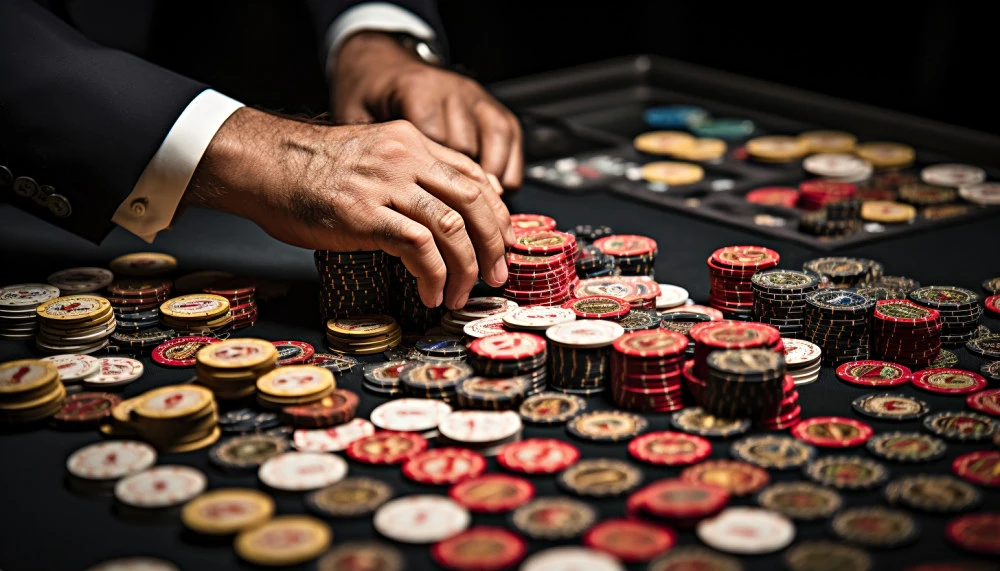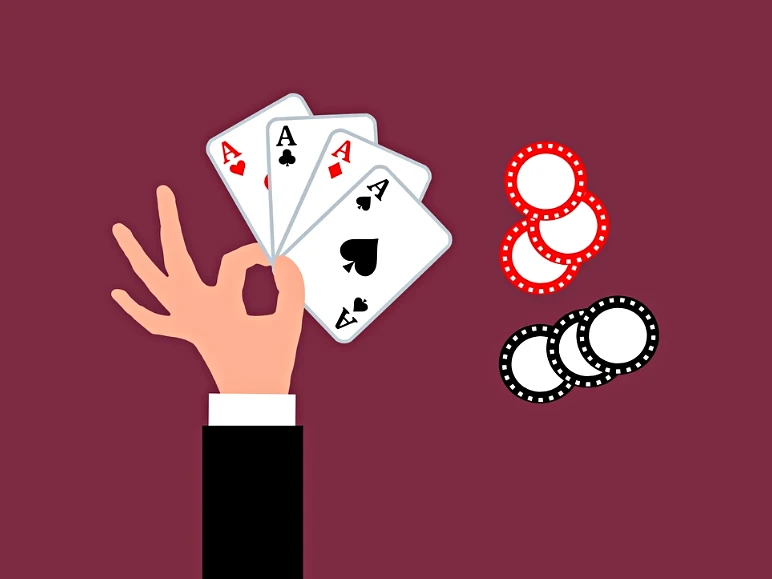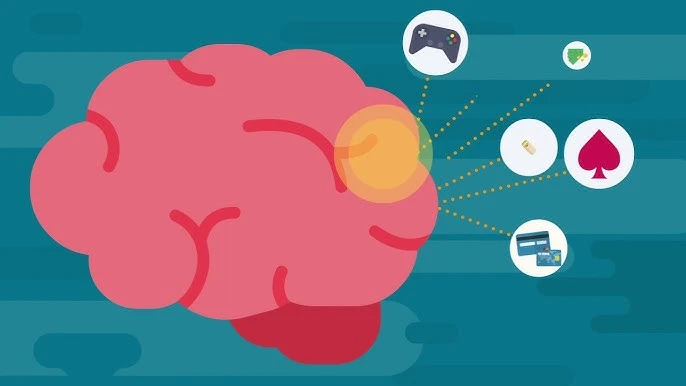Today, we have a different kind of article for you. We’re peeling back the layers to explore the psychological factors that draw people to casinos and games of chance.
We’ll dive into the inner workings, motivations, and the delicate balance between risk and reward. This makes gambling a captivating aspect of human behavior. Let’s examine the psyche behind the bets and the intriguing patterns that make gambling an internationally loved pastime.
Why are People Drawn to Gambling?
It’s an age-old question: why do people engage in activities where the odds are against them? To answer this, we explore the human mind and the factors making games irresistible.
The brain’s reward system isn’t only activated by winning. Near-misses, where players almost win but fall short, also influence motivation. Studies using fMRI show near-misses trigger similar reactions to actual wins. This effect heightens arousal and encourages continued, as the brain perceives near-misses as signs of future success.
Personality traits like sensation-seeking and impulsivity also contribute to gambling’s appeal. Additionally, exposure to ads and societal attitudes influence gambling engagement.

The Role of Risk and Reward
At the heart of gambling is the brain’s reward system. When we anticipate a big win, the brain releases dopamine, a neurotransmitter linked to pleasure and reinforcement. This dopamine surge creates euphoria and excitement, setting the stage for the thrill of a risky bet.
The brain’s response to risk is also fascinating. The amygdala, which processes emotions like fear, plays a crucial role. In the amygdala responds to uncertainty and potential loss, triggering heightened arousal and, paradoxically, excitement.
This balance between reward anticipation and risk thrills makes so captivating. It’s not just about the outcome; it’s the highs and lows that keep players on edge.
Psychologists often explore why some are more drawn to gambling. Individuals with higher sensitivity to rewards may experience stronger dopamine reactions, making potential gains feel more intense.
Conversely, risk-averse people may enjoy the challenge itself. Balancing risk with the chance of winning big.
Understanding gambling’s neurochemistry explains why some develop disorders. For compulsive gamblers, the pursuit of reward becomes overpowering, overshadowing potential losses.
However, not everyone who gambles develops problems. Many people enjoy gambling as entertainment without falling into addiction.
As we deepen our understanding of brain function, it’s clear that gambling’s appeal isn’t just luck or chance. It’s the neurochemical interplay and personal differences that fuel the dance between risk and reward, keeping games exciting.
Cognitive Biases in Shaping Gambling Behavior
Key aspect of human psychology, plays a major role in attracting people to gambling.
Cognitive biases are thought patterns that deviate from rational judgment. One relevant bias is the «gambler’s fallacy.» This bias involves the mistaken belief that past outcomes affect future ones in games of chance.
For instance, if a coin lands on heads repeatedly, the gambler’s fallacy makes one think tails is more likely next. This cognitive bias influences decisions, adding to the thrill and unpredictability of gambling.
From a psychiatric perspective, research links gambling’s allure to the brain’s reward system. Neurotransmitters like dopamine play a vital role in this process. The release of dopamine reinforces the excitement and keeps players engaged, even in unpredictable situations.
This interplay of cognitive biases and neurochemistry explains why gambling is so captivating to many.

When an individual gambles, the brain releases dopamine in response to perceived rewards or excitement. This dopamine surge creates pleasure, reinforcing the desire to keep gambling.
Psychologically, another key factor is variable reinforcement. Slot machines provide intermittent, unpredictable rewards, keeping players engaged. This form of reinforcement is highly effective in sustaining behavior, as players anticipate the next uncertain reward.
The concept of «loss aversion» also influences gambling behavior. Loss aversion refers to the tendency to avoid losses over gaining equivalent rewards. In gambling, this bias drives players to keep betting to recover losses, even when it’s more rational to stop.
The fear of missing out on a potential win often outweighs the discomfort of losing, perpetuating gambling. Understanding cognitive biases helps players make more responsible gaming. Choices and maintain healthier relationships with gambling.
For the industry, awareness of these psychological factors emphasizes the need for promoting responsible gambling and implementing harm-reduction measures.
Factors that Contribute to Addiction
We’d be remiss if we didn’t discuss the intricate psychology that can pave the way to gambling addiction.
For some, gambling becomes a refuge. A coping mechanism providing an escape from life’s challenges and stressors. Psychologically, this aligns with the notion of «avoidance coping». Where the gambling environment serves as a temporary reprieve.
The brain, in response, releases endorphins, offering momentary relief. Over time, this escape mechanism transforms into compulsive behavior as individuals increasingly turn to gambling during moments of overwhelming stress.
Another facet of gambling addiction involves a distorted perception of control over outcomes. This is associated with the «illusion of control» phenomenon, where the brain’s reward system. Influenced by neurotransmitters such as serotonin, reinforces the belief that one can influence or control. The results of gambling activities.
This perceived control becomes a potent motivator, pulling individuals deeper into the addictive cycle as they persistently chase the illusion of mastering unpredictable outcomes.
Moreover, social validation and recognition play a significant role in the realm of gambling addiction. Driven by the innate human need for approval, individuals seek acknowledgment from their peers. Even in the context of a premium gaming experience.
Psychologically, this desire activates the brain’s reward circuitry, with the release of oxytocin fostering feelings of social connection.
Online gambling platforms, through features like leaderboards and social interactions. Capitalize on these psychological needs. Creating an environment where individuals are compelled to continue gambling in pursuit of social validation.
How to Stop Unhealthy Cycles
At our gambling platform, we prioritize fostering a responsible and enjoyable gaming environment for all players.
Gambling habits often reflect broader behavioral patterns, with individuals seeking immediate rewards or stress relief. Recognizing these tendencies is the first step toward positive change. These patterns aren’t fixed but are learned behaviors that can be reshaped with understanding.
Self-reflection is a powerful tool for understanding gambling motivations. Is it entertainment, a coping mechanism, or financial pursuit? Are steps taken to avoid illegal gambling?
Honest self-reflection offers insights into the underlying reasons behind actions, encouraging constructive change.
Emotions often drive gambling behavior. Whether it’s the thrill of victory, fear of loss, or distraction. Developing emotional awareness means recognizing these triggers and finding healthier ways to manage them.

This could involve seeking support from friends. Exploring hobbies or using relaxation techniques to reduce stress. Breaking free from unhealthy cycles starts with setting realistic goals and boundaries. Defining a gambling budget or setting time limits creates a clear roadmap for positive change.
Celebrating small victories reinforces progress and helps maintain motivation. As gamblers work toward change, focusing on positive outcomes like improved finances and stronger relationships becomes a powerful motivator. Understanding these rewards encourages lasting transformation.

